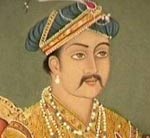 Akbar (1542 – 1605) The third Moghul Emperor, Akbar consolidated his Empire across India, through a series of striking military victories.
Akbar (1542 – 1605) The third Moghul Emperor, Akbar consolidated his Empire across India, through a series of striking military victories.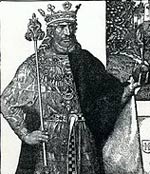 King Arthur 6th Century. Legendary King of the Britons who defended England against Saxon invaders, uniting the country.
King Arthur 6th Century. Legendary King of the Britons who defended England against Saxon invaders, uniting the country.
K ing Alfred (849 – 899) Alfred was King of Wessex. An educated and enlightened King, he defended Britain against the Vikings and was the first king to declare himself king of Anglo-Saxons.
ing Alfred (849 – 899) Alfred was King of Wessex. An educated and enlightened King, he defended Britain against the Vikings and was the first king to declare himself king of Anglo-Saxons.
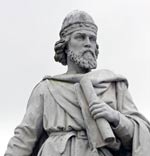 ing Alfred (849 – 899) Alfred was King of Wessex. An educated and enlightened King, he defended Britain against the Vikings and was the first king to declare himself king of Anglo-Saxons.
ing Alfred (849 – 899) Alfred was King of Wessex. An educated and enlightened King, he defended Britain against the Vikings and was the first king to declare himself king of Anglo-Saxons.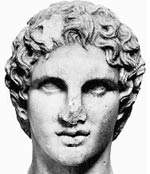 Alexander the Great (356 – 323 BC) As King of Macedonia, Alexander the Great established an Empire from the Ionian Sea to the Himalayas in India.
Alexander the Great (356 – 323 BC) As King of Macedonia, Alexander the Great established an Empire from the Ionian Sea to the Himalayas in India.
Mustafa Kemal Ataturk  (1881-1938) Military officer in the Turkish army. Ataturk led the Turkish independence struggle and founded the Turkish Republic.
(1881-1938) Military officer in the Turkish army. Ataturk led the Turkish independence struggle and founded the Turkish Republic.
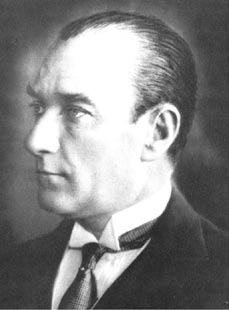 (1881-1938) Military officer in the Turkish army. Ataturk led the Turkish independence struggle and founded the Turkish Republic.
(1881-1938) Military officer in the Turkish army. Ataturk led the Turkish independence struggle and founded the Turkish Republic.
Attila the Hun (5th Century) Ruler of the Huns who swept across Europe.
(5th Century) Ruler of the Huns who swept across Europe.
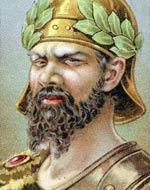 (5th Century) Ruler of the Huns who swept across Europe.
(5th Century) Ruler of the Huns who swept across Europe.
Douglas Bader (1910 –1982 ) Bader lost both legs in a flying accident in the 1930s. But, on the outbreak of the Second World War became a noted flying ace for the RAF.
(1910 –1982 ) Bader lost both legs in a flying accident in the 1930s. But, on the outbreak of the Second World War became a noted flying ace for the RAF.
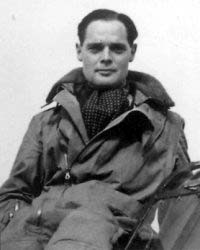 (1910 –1982 ) Bader lost both legs in a flying accident in the 1930s. But, on the outbreak of the Second World War became a noted flying ace for the RAF.
(1910 –1982 ) Bader lost both legs in a flying accident in the 1930s. But, on the outbreak of the Second World War became a noted flying ace for the RAF.
Napoleon Bonaparte (1769 – 1821) As Emperor of France 1804-1815, Napoleon’s forces swept across Europe, gaining hegemony over most of Europe. In many battles, Napoleon overcame numerical inferiority through the use of tactics.
(1769 – 1821) As Emperor of France 1804-1815, Napoleon’s forces swept across Europe, gaining hegemony over most of Europe. In many battles, Napoleon overcame numerical inferiority through the use of tactics.
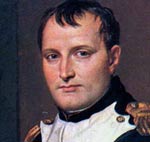 (1769 – 1821) As Emperor of France 1804-1815, Napoleon’s forces swept across Europe, gaining hegemony over most of Europe. In many battles, Napoleon overcame numerical inferiority through the use of tactics.
(1769 – 1821) As Emperor of France 1804-1815, Napoleon’s forces swept across Europe, gaining hegemony over most of Europe. In many battles, Napoleon overcame numerical inferiority through the use of tactics.
Boudicca (1st Century) Led British citizens in revolt against Roman occupation.
(1st Century) Led British citizens in revolt against Roman occupation.
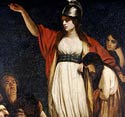 (1st Century) Led British citizens in revolt against Roman occupation.
(1st Century) Led British citizens in revolt against Roman occupation.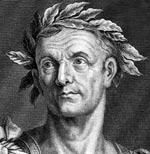 Julius Caesar (100 BC – 44 BC) Under Caesar, the Roman Empire stretched to its furthers points – crossing the Rhine and into Britain for the first time.
Julius Caesar (100 BC – 44 BC) Under Caesar, the Roman Empire stretched to its furthers points – crossing the Rhine and into Britain for the first time.
Leonard Cheshire (1917 – 1992) Bomber pilot in Second World War, with over 100 missions. Later founded the foundation for injured servicemen.
(1917 – 1992) Bomber pilot in Second World War, with over 100 missions. Later founded the foundation for injured servicemen.
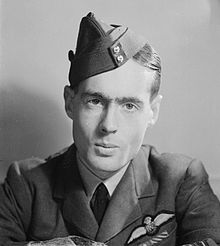 (1917 – 1992) Bomber pilot in Second World War, with over 100 missions. Later founded the foundation for injured servicemen.
(1917 – 1992) Bomber pilot in Second World War, with over 100 missions. Later founded the foundation for injured servicemen.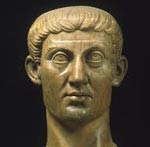 Constantine the Great (272 – 337) Constantine served as Roman emperor from 306 to 337. He successfully defeated both internal rebellions and consolidated the Roman Empire defeating the Franks, Alamanni, Visigoths, and Sarmatians.
Constantine the Great (272 – 337) Constantine served as Roman emperor from 306 to 337. He successfully defeated both internal rebellions and consolidated the Roman Empire defeating the Franks, Alamanni, Visigoths, and Sarmatians.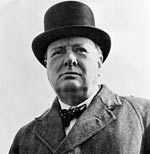 Winston Churchill (1874 – 1965) Winston Churchill became Prime Minister in May 1940, when Great Britain alone stood against Hitler. With stirring speeches, Churchill rallied the population and quashed those who wanted to make a deal with Hitler.
Winston Churchill (1874 – 1965) Winston Churchill became Prime Minister in May 1940, when Great Britain alone stood against Hitler. With stirring speeches, Churchill rallied the population and quashed those who wanted to make a deal with Hitler.
Dwight Eisenhower (1890 – 1969) A five star General in US army, Eisenhower was Supreme Allied Commander for the D-Day invasion of occupied Europe (1944-45).
(1890 – 1969) A five star General in US army, Eisenhower was Supreme Allied Commander for the D-Day invasion of occupied Europe (1944-45).
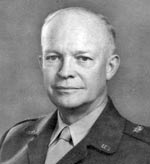 (1890 – 1969) A five star General in US army, Eisenhower was Supreme Allied Commander for the D-Day invasion of occupied Europe (1944-45).
(1890 – 1969) A five star General in US army, Eisenhower was Supreme Allied Commander for the D-Day invasion of occupied Europe (1944-45).
Douglas Haig (1861 – 1928 ) British First World War General who was in charge of British forces during the battle of the Somme. Towards the end of the First World War, he was relatively more successful.
(1861 – 1928 ) British First World War General who was in charge of British forces during the battle of the Somme. Towards the end of the First World War, he was relatively more successful.
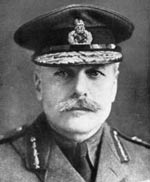 (1861 – 1928 ) British First World War General who was in charge of British forces during the battle of the Somme. Towards the end of the First World War, he was relatively more successful.
(1861 – 1928 ) British First World War General who was in charge of British forces during the battle of the Somme. Towards the end of the First World War, he was relatively more successful.
Adolf Hitler (1889 – 1945) Dictator of Nazi Germany. Ordered invasion of Poland, Western Europe, North Africa, and the Soviet Union.
(1889 – 1945) Dictator of Nazi Germany. Ordered invasion of Poland, Western Europe, North Africa, and the Soviet Union.
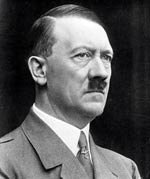 (1889 – 1945) Dictator of Nazi Germany. Ordered invasion of Poland, Western Europe, North Africa, and the Soviet Union.
(1889 – 1945) Dictator of Nazi Germany. Ordered invasion of Poland, Western Europe, North Africa, and the Soviet Union.
Genghis Khan – ( 1162 – 1227) From humble beginnings, Genghis Khan conquered Mongolia and China and then created an Empire stretching into Central Europe. His Mongol hordes were unstoppable.
1162 – 1227) From humble beginnings, Genghis Khan conquered Mongolia and China and then created an Empire stretching into Central Europe. His Mongol hordes were unstoppable.
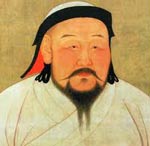 1162 – 1227) From humble beginnings, Genghis Khan conquered Mongolia and China and then created an Empire stretching into Central Europe. His Mongol hordes were unstoppable.
1162 – 1227) From humble beginnings, Genghis Khan conquered Mongolia and China and then created an Empire stretching into Central Europe. His Mongol hordes were unstoppable.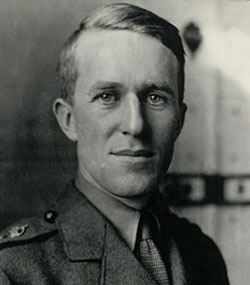 T.E. Lawrence (1888 – 1935) British officer who, during the First World War, led the Arab revolt against the Ottoman Empire in Arabia.
T.E. Lawrence (1888 – 1935) British officer who, during the First World War, led the Arab revolt against the Ottoman Empire in Arabia. Abraham Lincoln (1809 – 1865) President of the US during the civil war. He Led Union forces to victory in the civil war.
Abraham Lincoln (1809 – 1865) President of the US during the civil war. He Led Union forces to victory in the civil war.
Chairman Mao  (1893 – 1976) Led the Chinese Communist party to victory during the long march and fight against the nationalists.
(1893 – 1976) Led the Chinese Communist party to victory during the long march and fight against the nationalists.
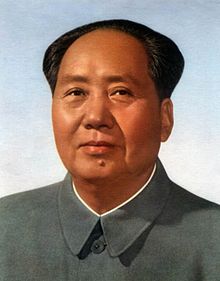 (1893 – 1976) Led the Chinese Communist party to victory during the long march and fight against the nationalists.
(1893 – 1976) Led the Chinese Communist party to victory during the long march and fight against the nationalists.
Bernar d Montgomery (1887 – 1976) British General during World War Two. Montgomery led the successful British action at El-Alamein. He also led British divisions during the liberation of occupied Europe.
d Montgomery (1887 – 1976) British General during World War Two. Montgomery led the successful British action at El-Alamein. He also led British divisions during the liberation of occupied Europe.
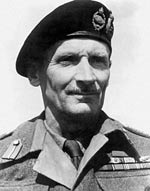 d Montgomery (1887 – 1976) British General during World War Two. Montgomery led the successful British action at El-Alamein. He also led British divisions during the liberation of occupied Europe.
d Montgomery (1887 – 1976) British General during World War Two. Montgomery led the successful British action at El-Alamein. He also led British divisions during the liberation of occupied Europe.
Lord Nelson (1758 – 1805) British naval officer during the Napoleonic wars. Nelson was a courageous officer who gained fame after dying during the Battle of Trafalgar (1805) – one of Britain’s greatest naval victories.
(1758 – 1805) British naval officer during the Napoleonic wars. Nelson was a courageous officer who gained fame after dying during the Battle of Trafalgar (1805) – one of Britain’s greatest naval victories.
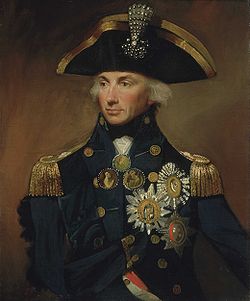 (1758 – 1805) British naval officer during the Napoleonic wars. Nelson was a courageous officer who gained fame after dying during the Battle of Trafalgar (1805) – one of Britain’s greatest naval victories.
(1758 – 1805) British naval officer during the Napoleonic wars. Nelson was a courageous officer who gained fame after dying during the Battle of Trafalgar (1805) – one of Britain’s greatest naval victories.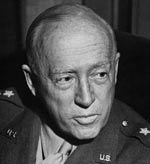 General Patton (1885 – 1945) US Commander during Second World War, Patton distinguished himself in Africa, Sicily and in the liberation of Frances – especially during the Battle of the Bulge.
General Patton (1885 – 1945) US Commander during Second World War, Patton distinguished himself in Africa, Sicily and in the liberation of Frances – especially during the Battle of the Bulge.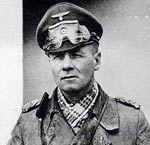 Erwin Rommel (1891 – 1944) ‘The Desert Fox’ was admired by both his troops and enemies developing a reputation for invincibility. He was a commander during the invasion of France (1940) and achieved striking victories in North Africa war.
Erwin Rommel (1891 – 1944) ‘The Desert Fox’ was admired by both his troops and enemies developing a reputation for invincibility. He was a commander during the invasion of France (1940) and achieved striking victories in North Africa war.
Saladin (1138 – 1193) L ed Islamic opposition to Christian crusades. Helped to unify Muslim armies
(1138 – 1193) L ed Islamic opposition to Christian crusades. Helped to unify Muslim armies
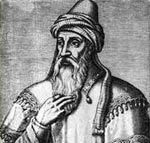 (1138 – 1193) L ed Islamic opposition to Christian crusades. Helped to unify Muslim armies
(1138 – 1193) L ed Islamic opposition to Christian crusades. Helped to unify Muslim armies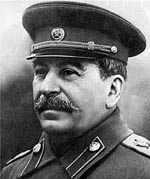 Joseph Stalin (1879 – 1953) Leader and dictator of Soviet Union armed forces during Second World War. His 1930s purges weakened the Russian army. But, in 1942 he led the defence of Russia from Moscow.
Joseph Stalin (1879 – 1953) Leader and dictator of Soviet Union armed forces during Second World War. His 1930s purges weakened the Russian army. But, in 1942 he led the defence of Russia from Moscow.
George Washington  (1732 – 1799) Leader of American forces during the War of Independence. Skilled military leader who won war despite losing individual battles.
(1732 – 1799) Leader of American forces during the War of Independence. Skilled military leader who won war despite losing individual battles.
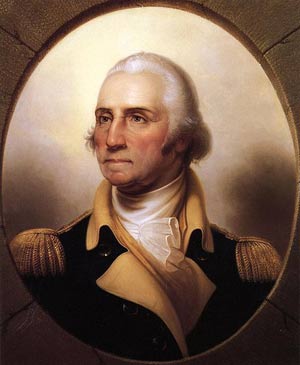 (1732 – 1799) Leader of American forces during the War of Independence. Skilled military leader who won war despite losing individual battles.
(1732 – 1799) Leader of American forces during the War of Independence. Skilled military leader who won war despite losing individual battles.
William Wallace  (13th Century) Scottish independence leader during the war of Scottish independence.
(13th Century) Scottish independence leader during the war of Scottish independence.
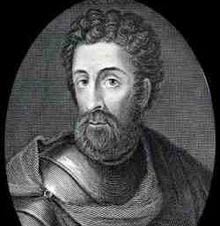 (13th Century) Scottish independence leader during the war of Scottish independence.
(13th Century) Scottish independence leader during the war of Scottish independence.
Barnes Wallis  (1887 – 1979) Best known for developing the bouncing bomb used in the Dambuster raid.
(1887 – 1979) Best known for developing the bouncing bomb used in the Dambuster raid.
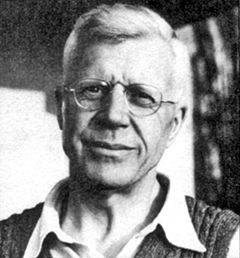 (1887 – 1979) Best known for developing the bouncing bomb used in the Dambuster raid.
(1887 – 1979) Best known for developing the bouncing bomb used in the Dambuster raid.
Duke of Wellington (1769 – 1852) Anglo-Irish statesmen. As a military officer, Wellington defeated Napoleon at the battle of Waterloo. He twice served as Prime Minister.
(1769 – 1852) Anglo-Irish statesmen. As a military officer, Wellington defeated Napoleon at the battle of Waterloo. He twice served as Prime Minister.
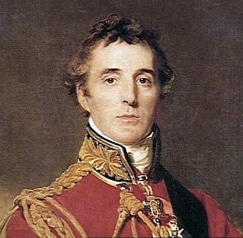 (1769 – 1852) Anglo-Irish statesmen. As a military officer, Wellington defeated Napoleon at the battle of Waterloo. He twice served as Prime Minister.
(1769 – 1852) Anglo-Irish statesmen. As a military officer, Wellington defeated Napoleon at the battle of Waterloo. He twice served as Prime Minister.Which One Is your Most Favorite Military General Tell Me In Comment Section ⬇Below
EmoticonEmoticon